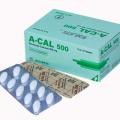Home / Categories / CALCIUM SANDOZ WOMEN-30'S

CALCIUM SANDOZ WOMEN-30'S
(1)
CALCIUM-500MG
CALCIUM AND RELATED COMPOUNDS
NOVARTIS
Product Details
Indication
Calcium plays a vital role in the anatomy, physiology and biochemistry of organisms and of the cell, particularly in signal transduction pathways. It is vital in cell signaling, muscular contractions, bone health, and signalling cascades.
Associated Therapies
- Dietary and Nutritional Therapies
Pharmacodynamics
Calcium (Ca2+) plays a pivotal role in the physiology and biochemistry of organisms and the cell. It plays an important role in signal transduction pathways, where it acts as a second messenger, in neurotransmitter release from neurons, contraction of all muscle cell types, and fertilization. Many enzymes require calcium ions as a cofactor, those of the blood-clotting cascade being notable examples. Extracellular calcium is also important for maintaining the potential difference across excitable cell membranes, as well as proper bone formation.
Mechanism of action
Calcium plays a vital role in the anatomy, physiology and biochemistry of organisms and of the cell, particularly in signal transduction pathways. More than 500 human proteins are known to bind or transport calcium. The skeleton acts as a major mineral storage site for the element and releases Ca2+ ions into the bloodstream under controlled conditions. Circulating calcium is either in the free, ionized form or bound to blood proteins such as serum albumin. Parathyroid hormone (secreted from the parathyroid gland) regulates the resorption of Ca2+ from bone. Calcitonin stimulates incorporation of calcium in bone, although this process is largely independent of calcitonin. Although calcium flow to and from the bone is neutral, about 5 mmol is turned over a day. Bone serves as an important storage point for calcium, as it contains 99% of the total body calcium. Low calcium intake may also be a risk factor in the development of osteoporosis. The best-absorbed form of calcium from a pill is a calcium salt like carbonate or phosphate. Calcium gluconate and calcium lactate are absorbed well by pregnant women. Seniors absorb calcium lactate, gluconate and citrate better unless they take their calcium supplement with a full breakfast. The currently recommended calcium intake is 1,500 milligrams per day for women not taking estrogen and 800 milligrams per day for women on estrogen. There is close to 300 milligrams of calcium in one cup of fluid milk. Calcium carbonate is currently the best and least expensive form of calcium supplement available.










